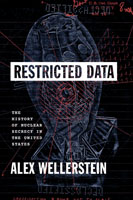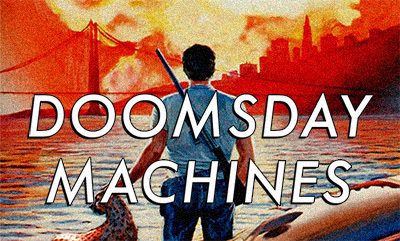Is the job of the historian to make the past look strange, or sensible?
I bring this up in the context of a very interesting discussion that Will Thomas has posted on his blog, Ether Wave Propaganda. Will’s post was in response to my previous post on imagery and metaphors; you should go to Will’s blog to see his comments and my comments on those.
The broader question that Will addresses — or at least, that I take him to be addressing — is one that has confounded me for some time. Historians in general, and especially historians of science, have for a long time rallied against the notion of “Whig history”: teleological historical accounts that explain how the past adds up in a logical fashion towards a rational present. Many historians have pointed out that this is something of a straw man, but that’s not really my concern here.
The question for me is what our duty to the past is. Do we make it look unusual, or do we make it look relatable?
There’s one pressure (usually represented by Thomas Kuhn, though in practice he’s problematic in this respect) for historian of science to explicate the weird, more or less. Get into the heads of the historical actors, make the thing that sounds ridiculous today — e.g. phlogiston, the luminiferous ether, Hobbes’ argument against the air-pump, and so on the list of historical “failures” — into something sensible. We should show, this argument goes, that the people in the past weren’t any more dippy or irrational than people are today. They just inhabited a world where different facts, theories, social categories, economic conditions, and so on reigned.
When it comes to things that seem to make sense, though, we’re often pressured to make them seem unusual and strange. So instead of seeing Einstein’s rejection of the ether as “natural” or “obvious,” we argue that it was in fact quite out of touch with the mainstream of his time, and not at all a pre-determined action. Instead of showing how the creation of government policies are little trains of intellectual, rational ideas tied together with thread, we show them as being murky manifestations of contingent conditions, personal interests, and baroque cultural or political forces.
So which is it? Is the past understandable or totally bizarre? There’s truth to both approaches, to be sure. The real question becomes, do we choose one method of explanation over another for any better reason other than to be counterintuitive? That is, if something seems obvious today, we reach for “contingency”; if something seems strange, we reach for “sensible within its own time.” It makes for a better story to do the un-obvious thing each time, to be sure, but does it make any intellectual sense?
One of the struggles I have in writing about organizations like the Atomic Energy Commission is that it’s easy to get sucked into their logic. My goal, on the one hand, is to get inside the heads of people who are long dead and gone, and who are espousing beliefs that I find to be quite odd in modern terms. Does it really matter if the military physically controls the bombs, or if a civilian organization does? Lots of very smart people thought it did back then, but it isn’t an issue with too much traction today. Figuring out the context of why people in the past believed something that seems odd today means re-tracing their context, their logics, the origins of their thoughts and actions. It’s the “making things sensible” action.
Make things too sensible, though, and you’ve fallen into another trap: now we’re making it look overly rational and obvious. Well, I don’t really want to do that, either. The policies in question weren’t handed down on etched tablets. They were a lot messier than that, and distinct choices were made, not always for “rational” reasons. Make them look too rational and you end up eliminating the contingent aspects — you lose the fact that history could have gone in a variety of directions at any one time, that plenty of “rational” opinions existed on the same issue at any given point, and that life as we experience it today is hardly dominated by “rational” decision-making (so why should expect the past to look any more rational?).
I end up personally veering between these extremes, looking for a sensitive, synthetic middle ground. I don’t actually mind saying that the practice of writing history leaves a lot to personal preference: it’s not a science (though it has what we might call evidence-based standards of practice), and anyone who has done it knows that you have to make a lot of decisions as to how to tell the story. It’s only amateurs — or poor standardized test-taking high school students, or the people who design those damned tests — who believe that history is just about memorizing a chronology of known facts, written down for all eternity.
I’d like to believe that there’s a “middle way” between the extremes, a synthesis that recognizes that the past is pretty strange, but not as strange as we might sometimes like to believe. In practice, I fear, this sort of non-commital balancing act may just be a recipe for not pleasing anybody. Which isn’t an appealing prospect, though neither is falling into either of those traps.



When you get right down to it, isn’t the present both pretty darn strange and pretty darn mundane?
In my mind, the present is and has always been a disturbing place (gateway, as it were, to an unknown future). And so I see the role of history as giving us other presents to compare and contrast with the current one. This would seem to be a point that Will Thomas is making, although I would tend to be more forgiving of historian’s motivations than he seems to be.
In any event, if the quality of your blogging so far is any indication, your middle way seems to be working.
This is a nice discussion, and I did marvel at the image in Will Thomas’s blog as well. I feel like I need to see the whole document, not just the cover page labeled “conclusion” though. I agree with John Blankenbaker above who said that present is pretty darned strange too, so rationalizing the past opens up a number of serious problems. It’s not unlike those who pressure historians to “stay relevant.” Relevant to what? If you look at the early nuclear tests, for example, there are so many stories to tell that have enormous implications for history (the utter indifference by humans to the fate of all the other species that were brought in as experimental subjects, for example) but would not at all seem interesting to people today (because we do the same things). Alex you are right that history isn’t a science, and yet we have a similar goal. We are trying to discover the past, which is fun for archive hounds like us, but interpretation is tough because we may be operating in the same paradigm as our actors (to follow your Kuhn reference). I usually end up with “pretty strange, but not so unfamiliar.” Anyway, I enjoy your posts, and I’ve been trying to tweet them like mad.
[…] of the time? There is nothing like steeping yourself in the news of a past period, to see how both strange and familiar it is, and to see how the grand and the mundane were always intermingled (as they are clearly […]
[…] And a lot more. As you can see, I’ve drawn on this history before for blog and Twitter posts — I look through it all the time, because it offers such an interesting view into the Manhattan Project, and one that cuts through a lot of our standard narratives about how it worked. There are books and books worth of fodder in here, spread among some tens of thousands of pages. Who knows what might be hidden in there? Let’s shake things up a bit, and find something strange. […]